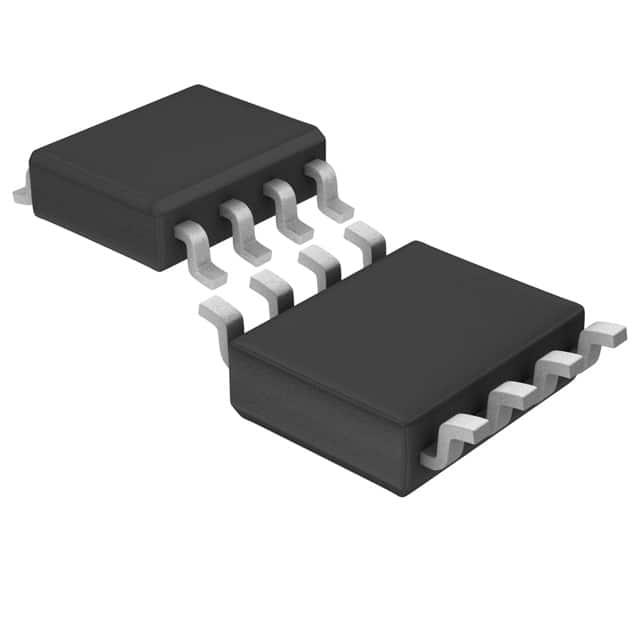LTC485CS8#PBF
Product Overview
Category
LTC485CS8#PBF belongs to the category of integrated circuits (ICs).
Use
It is commonly used in communication systems and industrial applications for data transmission.
Characteristics
- High-speed, low-power RS485/RS422 transceiver
- Supports data rates up to 20Mbps
- Operates from a single 5V supply
- Low quiescent current
- Wide common-mode range
- ESD protection on bus pins
- Available in an 8-pin SOIC package
Package and Quantity
LTC485CS8#PBF is packaged in an 8-pin small outline integrated circuit (SOIC) package. It is typically sold in quantities of one unit per package.
Specifications
- Supply Voltage: 5V
- Data Rate: Up to 20Mbps
- Operating Temperature Range: -40°C to +85°C
- Quiescent Current: 300µA (typical)
- Common-Mode Rejection Ratio: 60dB (typical)
Pin Configuration
The LTC485CS8#PBF has the following pin configuration:
- DE (Driver Enable)
- RE (Receiver Enable)
- A (Non-Inverting Data Line)
- B (Inverting Data Line)
- GND (Ground)
- Y (Receiver Output)
- Vcc (Supply Voltage)
- Z (Driver Output)
Functional Features
- Differential signaling for noise immunity
- Driver and receiver enable control for multi-drop applications
- Half-duplex operation
- Thermal shutdown protection
- Short-circuit and overvoltage protection
Advantages and Disadvantages
Advantages
- High-speed data transmission
- Low power consumption
- Wide operating temperature range
- Robust ESD protection
- Small package size
Disadvantages
- Limited to half-duplex operation
- Requires external control for driver and receiver enable
Working Principles
LTC485CS8#PBF is a high-speed RS485/RS422 transceiver that uses differential signaling to achieve noise immunity in data transmission. It operates in half-duplex mode, allowing bidirectional communication over a single pair of twisted-pair cables. The driver and receiver enable pins provide control for multi-drop applications, where multiple devices share the same communication bus.
Detailed Application Field Plans
LTC485CS8#PBF finds extensive use in various applications, including: 1. Industrial automation systems 2. Building automation and control networks 3. HVAC (Heating, Ventilation, and Air Conditioning) systems 4. Process control and monitoring systems 5. Instrumentation and measurement equipment 6. Data acquisition systems 7. Security and access control systems
Alternative Models
Here are some alternative models that can be considered as substitutes for LTC485CS8#PBF: 1. MAX485EESA+ 2. SN75176BP 3. ADM485ARZ 4. SP3485EN-L/TR
These models offer similar functionality and can be used as drop-in replacements in many applications.
In conclusion, LTC485CS8#PBF is a high-speed RS485/RS422 transceiver with excellent noise immunity and low power consumption. Its small package size and wide operating temperature range make it suitable for various industrial and communication applications. However, its limitation to half-duplex operation and the need for external control for driver and receiver enable should be taken into consideration during system design.
قم بإدراج 10 أسئلة وإجابات شائعة تتعلق بتطبيق LTC485CS8#PBF في الحلول التقنية
Sure! Here are 10 common questions and answers related to the application of LTC485CS8#PBF in technical solutions:
Question: What is LTC485CS8#PBF?
- Answer: LTC485CS8#PBF is a low power differential bus/line transceiver chip manufactured by Linear Technology (now part of Analog Devices). It is commonly used for communication between microcontrollers, sensors, and other devices.Question: What is the operating voltage range of LTC485CS8#PBF?
- Answer: The operating voltage range of LTC485CS8#PBF is typically between 4.5V and 5.5V.Question: What is the maximum data rate supported by LTC485CS8#PBF?
- Answer: LTC485CS8#PBF supports data rates up to 20 Mbps, making it suitable for high-speed communication applications.Question: Can LTC485CS8#PBF be used for half-duplex or full-duplex communication?
- Answer: Yes, LTC485CS8#PBF can be used for both half-duplex and full-duplex communication modes, depending on the configuration of the control signals.Question: What is the maximum number of devices that can be connected using LTC485CS8#PBF?
- Answer: LTC485CS8#PBF supports multi-point configurations, allowing multiple devices to be connected on the same bus. The maximum number of devices depends on factors such as cable length, termination, and noise immunity.Question: Does LTC485CS8#PBF provide built-in protection against ESD (Electrostatic Discharge)?
- Answer: Yes, LTC485CS8#PBF provides ±15kV ESD protection on the bus pins, ensuring robustness against electrostatic discharge events.Question: Can LTC485CS8#PBF be used in industrial environments?
- Answer: Yes, LTC485CS8#PBF is designed to operate reliably in harsh industrial environments, with features like high noise immunity and wide temperature range (-40°C to 85°C).Question: What is the typical power consumption of LTC485CS8#PBF?
- Answer: The typical power consumption of LTC485CS8#PBF is very low, making it suitable for battery-powered applications. It consumes around 1.5mA of supply current.Question: Does LTC485CS8#PBF support hot-swapping of devices?
- Answer: No, LTC485CS8#PBF does not support hot-swapping. It is recommended to power down the bus before connecting or disconnecting devices.Question: Are there any application notes or reference designs available for LTC485CS8#PBF?
- Answer: Yes, Analog Devices provides application notes and reference designs on their website that can help in understanding and implementing LTC485CS8#PBF in various technical solutions.
Please note that the answers provided here are general and may vary depending on specific implementation requirements. It is always recommended to refer to the datasheet and application notes provided by the manufacturer for detailed information.


